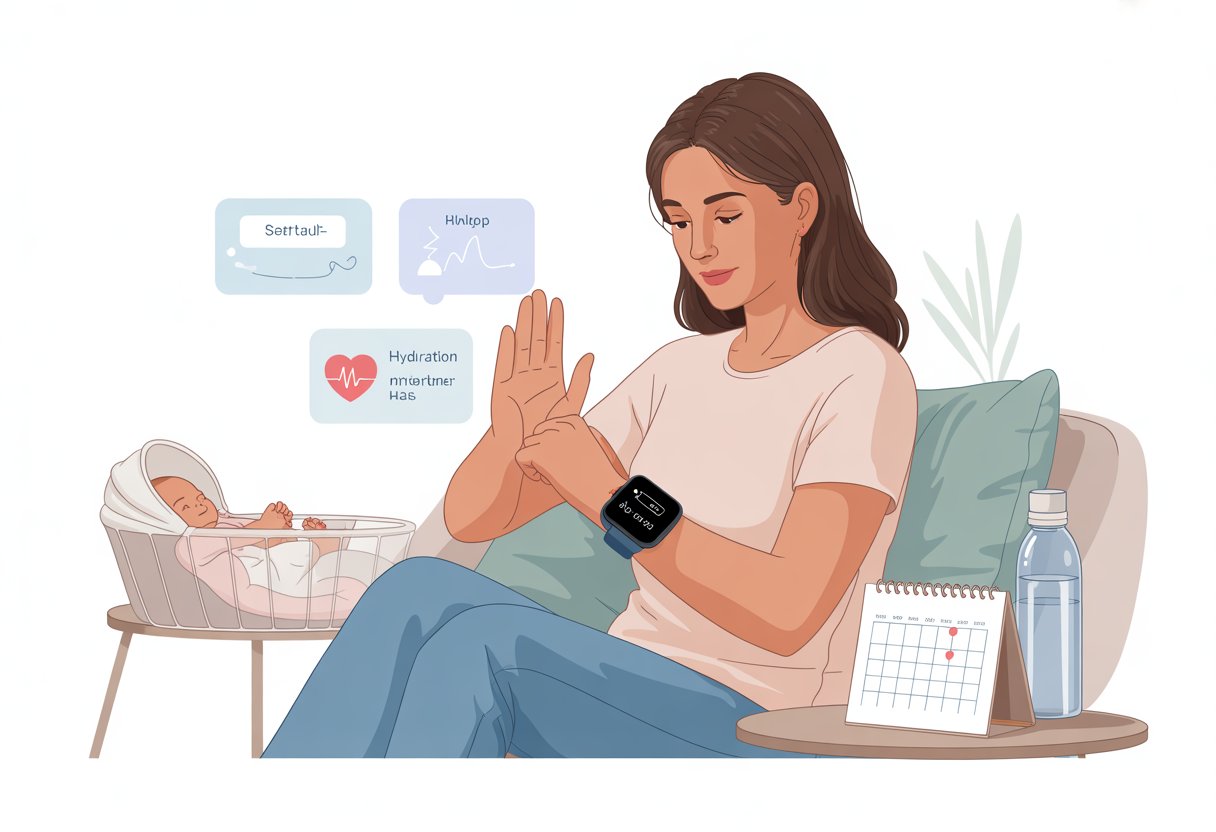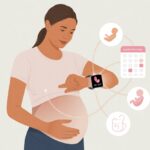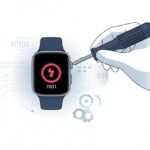Let’s be real—those first months after having a baby? They’re wild. Sometimes it feels like you’re just trying to remember where you left your brain.
Between endless feedings, a mountain of diapers, and sleep that comes in tiny, weird bursts, your health can drop way down the priority list. But with a smartwatch, tracking your recovery and well-being actually gets simpler. You get real-time insights, and you don’t need to add one more thing to your mental load.

A smartwatch can help you check on your sleep (what’s left of it), count your steps when you’re endlessly pacing, and even keep tabs on health signs.
Some watches even notice early signs of postpartum struggles, which is honestly a relief when everything feels like a blur. You can read more about that in this article on wearable devices for postpartum health.
So, let’s grab our smartwatches and see how they can help us juggle motherhood with a bit more peace of mind. Maybe we’ll even get more reminders to drink water (because who remembers that on their own?).
Ready to see how a little gadget on your wrist can become your new best friend? Let’s dive in.
Understanding the Role of Smartwatches in Postpartum Health
Smartwatches aren’t just step counters anymore. Now they check on our sleep, notice our mood swings, and even nudge us when we forget to drink water (again).
These features actually help us take better care of ourselves after childbirth—sometimes in ways we didn’t expect.
What Is Postpartum Health?
Postpartum health covers how a mom feels and functions after giving birth. It’s not just about physical recovery, like healing from delivery, but also about mental health—energy, mood, and sleep all matter.
Sleep deprivation turns into a personal nemesis, hormones go a bit wild, and emotions run high. The World Health Organization (WHO) says new moms need both physical and emotional support right now.
Sometimes, changes in blood pressure, heart rate, or even skin temperature can give us early warning signs. If we catch these clues early, we can get help before things get out of hand.
How Wearable Technology Supports New Moms
With all the chaos—diapers, feedings, and everything else—it’s easy to forget our own needs. That’s where wearable tech steps in as our secret sidekick.
Smartwatches track heart rate, sleep, and activity, quietly collecting useful data in the background. Some studies say these gadgets can monitor for signs of postpartum depression or complications by watching for weird sleep patterns, low activity, or big changes in vitals.
Cloud-connected wearables help doctors see our data in real time, spotting issues faster than ever. That’s a win for maternal health.
Wearing a smartwatch can remind us to move, breathe, or even take a guilt-free nap. Not bad for something that sits on your wrist.
Key Features to Look for in a Wearable Smartwatch
Not every smartwatch is up for the job. Some just nag us about steps, but others act like mini medical assistants.
When shopping, look for these features:
- Heart rate monitoring: Tracks stress and physical changes.
- Sleep tracking: Watches when and how well we rest.
- Activity reminders: Nudges us to move when we’ve been still too long.
- Mobile alerts: Reminds us about doctor visits or meds.
- Data sharing: Lets us send info to our health team safely.
Oh, and a battery that lasts longer than your coffee buzz? Absolutely essential. Smartwatches with these features give us support without adding more gadgets to the mix.
Setting Up Your Smartwatch for New Mom Life
A smartwatch can actually make life smoother—if you set it up right. Syncing and customizing notifications means you’ll only get the alerts that matter.
Getting Started: Syncing and Consent
First, open the box and (ugh) read the directions. Pair your watch with your phone, usually with Bluetooth.
That’s like a digital handshake, but less awkward. The watch might ask for health info—your age, height, weight.
It sounds nosy, but it helps track steps, sleep, and heart rate accurately. Check which apps want your data and only say yes to what you’re comfortable with.
Some devices want to sync with third-party apps like fitness trackers or calendars. It’s smart to review these requests before approving.
If you need step-by-step help, guides like this one at K&F Concept can walk you through setup and entering personal info.
Customizing Alerts and Notifications
Now for the fun part—choosing which notifications you actually want at 3 am. You get to pick which calls and messages come through (sorry, spam calls).
Use the settings to filter out stuff you don’t need, like marketing emails or random app updates. For new moms, alerts for hydration, medication, or feeding schedules can be lifesavers.
Some watches even remind you to move, so you don’t turn into a couch fossil. You can set custom vibrations for different alerts, so you know if it’s a “baby needs you” buzz or just a weather update.
Setting things up right helps you keep your phone out of your hands and your focus where you want it—on baby (and maybe your coffee). Need more ideas? Check out how smartwatches help moms stay off their phones.
Real-Time Health Monitoring for Moms
Smartwatches let us check our health stats without juggling a pile of gadgets. With a tap or a glance, we get updates on heart rate, blood pressure, and even those unpredictable glucose swings.
Heart Rate Monitoring Essentials
Our bodies don’t always warn us when something’s off, but our smartwatches do. By measuring pulse right from the wrist, these gadgets show us our beats per minute in real time—no stethoscope needed.
We can spot when our heart’s racing or dropping low, which helps us know when to slow down (or maybe just hide from a toddler meltdown). Most smartwatches use optical sensors, so the data’s always ready.
Some watches even let us set alert thresholds. If things get wild—like our heart rate spikes during a diaper disaster—our wrist vibrates, and we know it’s time to take a breath.
High Blood Pressure Alerts
Forget digging for that old blood pressure cuff. Many new smartwatches offer continuous blood pressure tracking, which is a huge relief for anyone at risk after delivery.
These wearables track blood pressure trends all day. If our numbers creep up, our watch gives a friendly buzz—way better than a lecture.
Real-time alerts help us act fast, whether that means calling a doctor or just pausing for water. Some medical devices even stick right to the skin near our chest, sending data to doctors for postpartum care.
You’ll feel a bit like a high-tech secret agent. One wearable device for high-risk postpartum women uses skin sensors to track heart and blood pressure data.
Tracking Gestational Diabetes and Glucose Levels
Smartwatches and wearables aren’t magic, but for those tracking gestational diabetes, they make life easier. Some sync with continuous glucose monitors (CGMs), or let us log blood sugar after meals.
No more guessing if that “just one more cookie” was a mistake. Glucose tracking helps us spot trends, see how our bodies react to different foods, and share info with our healthcare team—all from our wrist.
Some platforms even offer goal tracking and reminders for checking blood sugar or taking meds, all in a way that feels supportive, not judgey.
Remote patient monitoring systems help moms keep glucose and other vitals on track. That’s a big deal for managing gestational diabetes and lowering risks for us and our babies.
Want more details? Here’s how remote monitoring tech is changing maternal health.
Mental Health Tracking With a Smartwatch
Our smartwatches do more than buzz when our toddler tries to stash snacks in the couch. They keep an eye on our mental health by tracking mood changes, sleep patterns, and stress.
Handy analytics help us spot what’s really going on, even when we’re too tired to notice.
Spotting Early Signs of Postpartum Depression
Honestly, it’s tough to know when postpartum depression is creeping in, but our wrists might notice before we do. If we use our smartwatches often, they gather info on daily activity, heart rate, and sleep quality.
These wearables are smarter than they look. They pick up on changes in sleep and activity patterns, which can link to mood disorders like postpartum depression.
When the numbers dip or spike, our smartwatch nudges us—maybe skipping every other nap (for us, not the baby) isn’t the best plan.
By checking this data, we can talk to a healthcare provider sooner instead of just guessing if it’s a bad week or something bigger. For moms wanting to catch postpartum depression early, these little wrist buddies offer early detection tools that are surprisingly helpful—no PhD needed.
Mood and Anxiety Tracking
Honestly, mood swings aren’t just for toddlers. Our moods can feel all over the place, but smartwatches let us jot down how we’re feeling as the day rolls on.
Most watches give us quick mood tracking—tap if you’re happy, anxious, tired, or maybe just running on fumes.
Some models use sensors to watch our heartbeat for clues about anxiety. Pair those numbers with some charts, and we start to see patterns. Did two rough nights of sleep crank up our stress, or was it that surprise visit from the in-laws?
When we bring this info to our healthcare team, we’re not just saying, “I feel weird.” We’re showing real numbers, maybe even proof that a snack really does boost our mood for a bit. It’s self-care with receipts, and honestly, we’re into it.
Curious about how heartbeats tie into mental health? Check out this guide to tracking mental health through your heartbeat.
Activity, Sleep, and Recovery Analytics
Trying to get back in shape after having a baby? It’s a wild ride. Smartwatches help us keep tabs on steps, sleep, and even gentle workouts.
Step Counting for New Mom Motivation
Let’s be real: walking to the laundry room should totally count as exercise. Smartwatches track every step—even those midnight nursery laps.
Step tracking makes boring chores feel like tiny wins. If you’re stuck on the couch, that little buzz on your wrist can nudge you to move.
We set daily goals and watch the numbers add up. Hitting 5,000 steps? That’s a boost. Some devices even let us join step challenges, so it feels like a team sport.
Looking at step trends helps us spot our most active (and laziest) days. That way, we set goals that actually make sense. Want more tips? Check out the benefits of smartwatch step tracking for postpartum activity.
Sleep Tracking (Yes, Napping Counts!)
Do we sleep anymore? Our smartwatches seem to think so, and they’ve got the data to prove it. Every nap, even those 20-minute snoozes, gets logged.
Sleep analytics break down light, deep, and REM sleep. We learn our averages, see where we’re losing out (thanks, 2 a.m. feedings), and notice how rest changes our energy—well, most of the time.
Some smartwatches have gentle alarms that wake us at the right moment. Waking up less groggy? Yes, please.
Want to read more? Here’s how wearables help track sleep patterns for recovery.
Training Plans for Gradual Fitness Recovery
Getting back into fitness takes patience—and maybe some techy encouragement. Many smartwatches offer training plans designed for new moms easing into exercise.
We can tweak these plans to fit our goals and schedule. Progress analytics show us even the tiniest improvements.
Instead of guessing, our smartwatch helps us figure out the right intensity and when to rest. Reminders pop up to move or chill out based on what we’ve actually done.
The feedback is instant, and honestly, less judgy than family. For more on postpartum training, see how wearable technology supports athlete recovery.
Using Your Smartwatch for Health Data Sharing
Sharing health data can feel weird, but sometimes it’s a lifesaver. Our smartwatches help keep our care team (or nosy family) updated on our recovery.
Communicating With Healthcare Providers
Ever try to explain a weird symptom to your doctor and just shrug? With a smartwatch, we can do better.
These gadgets track real numbers—heart rate, sleep, even those steps from 3 a.m. diaper runs.
Many smartwatch apps let us export health info to our phones or send reports to doctors. We pick what to share—heart rate, blood pressure (if it tracks that), or exercise logs.
If our doctor needs to know why we’re feeling off, they’ll have more than just our wild stories.
Sometimes, problems after birth sneak up. Smartwatches can spot signs we’d miss, like weird heart rate trends. Bringing this data to appointments saves us from forgetting the important stuff.
Let’s be honest: our partners and families love to check in. Smartwatch data sharing means they can see if we’ve slept—or if we’re officially a zombie.
Some apps let us set up shared dashboards. Family can get notifications about our activity, sleep, or mood if we want. They might nudge us to nap or offer help if our sleep stats look rough.
Healthy competition helps too. If our steps are low, a “race you to the fridge” text might get us moving. For bigger support teams—like extended family or support groups—sharing health metrics helps everyone know when to step in, not just when we finally ask.
Let’s keep our people in the loop with real info, not just guesses. It might just save everyone’s nerves.
Safety Tips, Privacy, and Getting the Most From Your Smartwatch
Let’s keep our data (and pride) safe while squeezing every bit of help from our smartwatch.
We can set reminders, track health, and maybe dodge those “steps goal not met” alerts.
Ensuring Your Data Stays Safe
Nobody wants their heart rate or late-night feeding logs floating around the internet. Start with a strong lock screen password or PIN.
Most watches let us do this, so strangers can’t snoop if we lose it.
Two-factor authentication is a must—it makes breaking in way harder. Only link apps we trust, and yeah, skim those privacy policies even if they’re boring.
Stick to official app stores instead of sketchy downloads at 2 a.m.
Sometimes watches try to pair with every device nearby, but we can block unauthorized pairing to keep things private.
If tracking biometrics feels off, it’s totally fine to opt out. Smartwatches are cool, but our comfort always comes first.
Want more? Check out simple privacy steps from Bitdefender and Kaspersky.
Self-Care Reminders & Gentle Encouragement
Let’s be honest—our smartwatch alarms can do more than just tell us to get up and walk. Why not use them for reminders about hydration, medication, or even a deep-breathing break after a diaper blowout?
We already get plenty of nagging from babies, so now our watch joins in, too! Setting up repeated self-care reminders helps us avoid forgetting our own needs when new parenthood turns everything upside down.
If you decide to use them, most smartwatches track sleep and recovery. They’ll nudge you to rest—or at least give it a shot.
Motivational notifications don’t have to feel judgy. Sometimes it’s just a fist bump emoji or a gold star popping up when you need it most.
When you set up routines that work for you, these features run quietly in the background. They’ll remind you to move, grab a snack, drink some water, or just take a breath.
Customizing reminders makes all the difference. Choose what actually matters to you, so your watch sends encouragement instead of guilt.
Honestly, that’s how digital health tools start to feel helpful—and maybe even a bit fun—when you’re in the thick of postpartum life.
- How to use a smartwatch for postpartum health: Because your baby isn’t the only one who needs monitoring - November 2, 2025
- How to use a smartwatch for ECG readings: Because Your Wrist Knows More Than Your Ex - November 1, 2025
- How to use a fitness tracker for podcast listening: Steps, Strides, and Satisfying Stories - November 1, 2025






